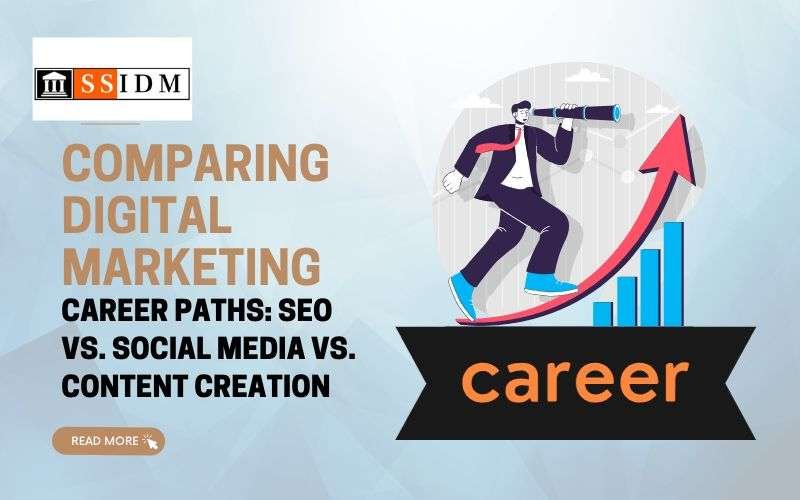Comparing Digital Marketing Career Paths: SEO vs. Social Media vs. Content Creation

Introduction to Digital Marketing Careers
Digital marketing is a vast and dynamic field with various career paths, each offering unique opportunities and challenges. As businesses increasingly rely on digital channels to reach their audiences, the demand for skilled professionals in SEO, social media, and content creation is growing. But how do these career paths compare? In this article, we’ll delve into the specifics of each path and help you decide which might be the best fit for your skills and career goals.
Understanding the Roles
To make an informed decision, it’s crucial to understand the core functions of each role in digital marketing.
What is SEO?
Search Engine Optimization (SEO) involves optimizing websites to rank higher in search engine results pages (SERPs). SEO professionals focus on improving a site’s visibility through keyword research, on-page optimization, and link building. Their goal is to increase organic traffic and drive more qualified leads to the website.
What is Social Media Marketing?
Social media marketing revolves around promoting brands and engaging with audiences through platforms like Facebook, Twitter, Instagram, and LinkedIn. Social media marketers create and manage content, run ad campaigns, and analyze performance to build brand awareness and foster customer relationships.
What is Content Creation?
Content creation involves producing various types of content, such as blogs, articles, videos, and infographics, to attract and engage audiences. Content creators focus on crafting compelling narratives and visuals that resonate with the target audience and drive engagement.

SEO Career Path
If you’re detail-oriented and enjoy analyzing data, Search Engine Optimization might be the career path for you.
Skills Required for SEO
SEO professionals need a blend of technical and analytical skills. Key competencies include understanding search engine algorithms, keyword research, on-page and off-page optimization, and familiarity with tools like Google Analytics and SEMrush.
Typical Job Responsibilities
SEO specialists are responsible for conducting keyword research, optimizing website content, analyzing website performance, and implementing strategies to improve search rankings. They also stay updated with the latest SEO trends and algorithm changes.
Career Opportunities and Growth
The SEO field offers various roles, including SEO Analyst, SEO Manager, and SEO Director. With experience, you can progress to strategic roles such as SEO Consultant or even start your own SEO agency. The demand for SEO professionals remains strong, with many businesses seeking to enhance their online presence.
Pros and Cons of an SEO Career
Pros:
- High demand for skilled professionals
- Opportunities for continuous learning
- Potential for career advancement and specialization
Cons:
- Requires staying updated with frequent algorithm changes
- Can be challenging to measure direct ROI

Social Media Marketing Career Path
For those who thrive in a dynamic and interactive environment, social media marketing can be a rewarding career.
Skills Required for Social Media Marketing
Social media marketers need strong communication skills, creativity, and an understanding of various social media platforms. Key skills include content creation, social media analytics, and campaign management.
Typical Job Responsibilities
Social media marketers create and schedule posts, manage social media accounts, run ad campaigns, and analyze performance metrics. They also engage with followers and monitor social media trends to optimize strategies.
Career Opportunities and Growth
Career paths in social media marketing include Social Media Manager, Community Manager, and Social Media Analyst. As businesses expand their digital presence, opportunities for growth and specialization in areas like influencer marketing or social media strategy are increasing.
Pros and Cons of a Social Media Marketing Career
Pros:
- Engaging and fast-paced work environment
- Opportunities to work with various brands and industries
- Creative freedom in content creation
Cons:
- Can be stressful with tight deadlines and constant platform changes
- Requires dealing with negative feedback and online criticism

Content Creation Career Path
If you have a passion for storytelling and creating engaging content, a career in content creation might be ideal.
Skills Required for Content Creation
Content creators need strong writing and editing skills, creativity, and a good understanding of SEO. Proficiency in tools like Adobe Creative Suite and knowledge of content management systems (CMS) are also beneficial.
Typical Job Responsibilities
Content creators develop written and visual content, manage content calendars, and collaborate with marketing teams to ensure content aligns with brand goals. They also analyze content performance and make data-driven improvements.
Career Opportunities and Growth
Content creation roles include Content Writer, Content Strategist, and Creative Director. With experience, you can specialize in areas like video production or become a freelance content creator. The demand for high-quality content continues to grow as brands seek to engage their audiences effectively.
Pros and Cons of a Content Creation Career
Pros:
- Creative and fulfilling work
- Opportunities to work on diverse projects
- Flexibility with freelancing options
Cons:
- Can involve tight deadlines and high-pressure environments
- Income may be inconsistent, especially for freelancers
Comparing the Three Career Paths
To choose the right career path, it’s essential to compare job stability, work environment, salary expectations, and required skills.
Job Stability and Demand
All three roles—SEO, social media marketing, and content creation—are in high demand. However, SEO professionals often experience more stability due to the ongoing need for optimization in search engines. Social media marketing roles may be more volatile, with trends and platform changes influencing job security. Content creation can vary depending on industry demand and personal reputation.
Work Environment and Culture
SEO professionals often work in analytical and technical environments, focusing on data and algorithms. Social media marketers work in dynamic and interactive settings, engaging directly with audiences and managing online communities. Content creators may have a more flexible work environment, especially if freelancing, but can also face deadlines and client demands.
Salary Expectations
Salaries can vary based on experience, location, and industry. Generally, SEO specialists and social media managers can command competitive salaries, with SEO roles often offering slightly higher pay due to the technical skills required. Content creators’ earnings can range widely, particularly for freelancers, but experienced professionals in high-demand niches can earn substantial incomes.
Required Skills and Education
All three paths require a mix of technical and creative skills. SEO demands a strong understanding of search engine algorithms and data analysis. Social media marketing requires expertise in social media platforms and analytics. Content creation focuses on writing and creativity. Formal education in marketing or communications can be beneficial, but practical experience and skills often weigh more heavily.
How to Choose the Right Path for You
Choosing the right career path involves assessing your strengths, interests, and long-term goals.
Assessing Your Strengths and Interests
Reflect on what excites you most about digital marketing. Do you enjoy analyzing data, creating engaging content, or managing social media campaigns? Understanding your strengths and passions will guide you toward the path that aligns best with your skills.
Aligning Career Goals with Industry Trends
Research current industry trends to ensure your chosen path aligns with future growth opportunities. For instance, if AI and automation are shaping the future of SEO, consider how you can adapt and leverage these trends.
Gaining Relevant Experience and Certifications
Hands-on experience and certifications can boost your career prospects. Consider internships, freelance projects, or specialized courses to gain practical experience and demonstrate your expertise to potential employers.
Conclusion
In conclusion, choosing between SEO, social media marketing, and content creation depends on your personal interests, skills, and career goals. Each path offers unique opportunities and challenges, and understanding the differences can help you make an informed decision. Whether you lean towards the analytical world of SEO, the dynamic realm of social media marketing, or the creative field of content creation, SSIDM can provide the training and resources you need to succeed. Embrace your passion, and take the first step towards a rewarding career in digital marketing.







